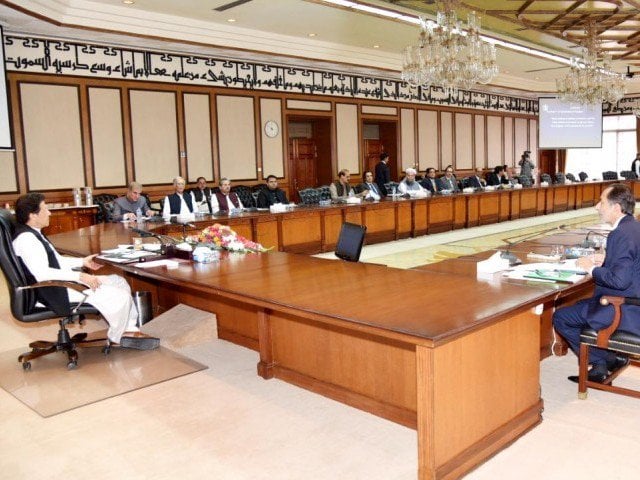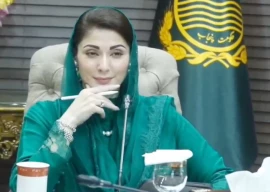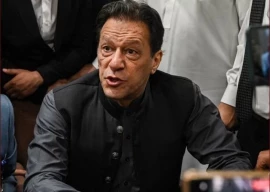
"It is a defining moment for Pakistan as the federal cabinet has approved eight laws of public interest," said Minister for Law and Justice Barrister Farogh Naseem while addressing a news conference after attending the cabinet meeting.
Flanked by Special Assistant to the Prime Minister on Information and Broadcasting Dr Firdous Ashiq Awan, he said the laws included The Letters of Administration and Succession Certificates, The Enforcement of Women's Property Rights Ordinance 2019, The Benami Transaction (Prohibition) (Amendment) Ordinance 2019, The Superior Courts (Courts Dress and Mode of Address) Order (Repeal) Ordinance, 2019, The National Accountability (Amendment) Ordinance 2019, Legal Aid and Justice Authority Ordinance, 2019 and ordinances related to the Whistle Blower Act and amendments in the Civil Procedure Code.
He said the amendments in the CPC would ensure speedy and expeditious justice for masses who had been enduring year-long lawsuits in civil courts. "The provision of speedy justice is the only way forward to change the status quo prevailing in the country," he added.
Firdous said the federal cabinet had approved an agreement between the Ministry of Housing and Akhuwat Islamic Microfinance in an effort to build five million housing units for low-income people.
She said under the accord, a fund of Rs5 billion would be utilised to give interest-free loans of Rs100,000 to Rs1 million to the poor people.
"Priority will be given to those homeless people who are registered under the 'poverty score card survey'," she added.
Dr Firdous said the cabinet also approved an internship programme under which the Ministry of Communications would give technical training and employment to some 35,000 students every year.
She said the cabinet meeting chaired by Prime Minister Imran Khan approved solar power projects to meet electricity needs of army on build-operate-transfer basis.
The cabinet was told that a large share of the army resources was spent on supply of uninterrupted supply to houses, offices, parks and hospitals in garrisons and cantonments.
In order to bring down the expenditure, solar plants would be set up to reduce dependence on expensive power and replace it with cheap electricity.
The cabinet was also given a detailed briefing on the alternative sources of energy.
It was informed that a pilot project had been started to connect farmers and markets for sale of everyday items and to end the role of middlemen.
A mobile application had been prepared to provide information to the people about the rates of items of essential use, including fruits and vegetables.
In the first phase, the app was launched for different sectors of Islamabad and later on the project would be expanded to other big cities.
"The federal government with the assistance of provinces is making a comprehensive plan for end of adulteration in food," she quoted the prime minister as saying during the meeting.
In order to bring transparency in governance, the cabinet also decided to provide all information about its decisions to the National Accountability Bureau (NAB) on its request.
The cabinet approved the appointment of honorary members for the Trust for Voluntary Organisation.
The prime minister said the Supreme Court would be asked to review its decision about the condition of advertisement for appointment on honorary posts in policy boards.
The cabinet also approved the board of directors for Inter State Gas Company and appointment of Asjad Imtiaz Ali as member of Indus River System Authority.
It also gave a go-ahead for amendment in The Drugs (Licensing, Registering and Advertising Rules, 1976).
The cabinet gave its assent for an agreement between Pakistan and India for implementation of Kartarpur Corridor project.
The prime minister directed the officers of Ministry of Foreign Affairs and others to provide all possible facilities to the Sikh yatrees (pilgrims), who would visit Kartarpur.
The provision of facilities would be continuously monitored so that the Sikh yatrees might not face any inconvenience. The project would be inaugurated on November 9.
At the start of the meeting, different ministries presented their suggestions for the welfare of the people.
The Establishment Division told the meeting that it was made mandatory for the Grade 17-18 officers serving on administrative posts in different districts and tehsils to initiate self-sustaining projects of public welfare.
These projects would be considered while judging the performance of officers for career progression.
Dr Firdous said the Ministry of Human Rights submitted a suggestion to the cabinet to start an awareness campaign regarding exploitation of children.
For the campaign, complete support of civil society, mosques and teachers would be sought and the people would be made aware of the issue.
A programme, she said, would be started for the education and training of girls so that when they grow up they could take up responsibilities in the society.
Steps would also be taken to protect the rights of transgender persons.
The Ministry of Anti-Narcotics Control informed the meeting about its suggestion to launch 'Zindagi app' to rehabilitate the people affected by drugs. Another app would be for providing technical services like plumbing at homes. The minister of state for climate change said the corporate social responsibility projects of companies should be organised on institutional lines under the Securities and Exchange Commission of Pakistan.
The Ministry of Human Rights told the cabinet that the universities had been instructed to end or reduce the fees of students suffering from disabilities.
Dr Firdous said the opposition targeted her in a press conference after she gave facts about the health of former prime minister Nawaz Sharif.
She said when Nawaz was being shifted to a hospital from the NAB office in Lahore, his workers were burning tyres and shouting slogans while carrying party flags.
She assured that the government would never do politics on the health of a person.
She condemned the language used by the opposition leaders against her, saying in reality the opposition did politics on Nawaz's disease.
He was eating unhealthy food with a dose of two Loprin tablets which thinned the blood that could reduce the platelets, she claimed.
Dr Firdous refuted the allegation of opposition that Nawaz was poisoned.
Corruption was a poison in itself and Prime Minister Imran Khan was determined to root out that virus, she added. (With additional input from app)
1731916090-0/sabrina-(3)1731916090-0-405x300.webp)


1732020599-0/BeFunky-collage-(73)1732020599-0-165x106.webp)
1731926127-0/zayn-(1)1731926127-0-165x106.webp)


1724319076-0/Untitled-design-(5)1724319076-0-270x192.webp)









COMMENTS
Comments are moderated and generally will be posted if they are on-topic and not abusive.
For more information, please see our Comments FAQ